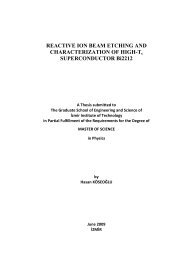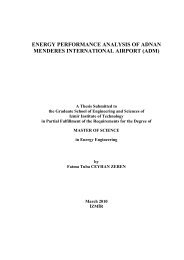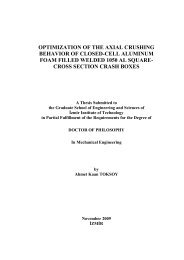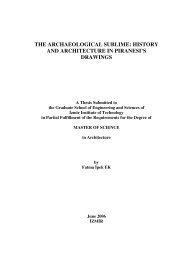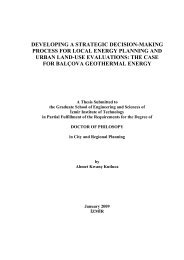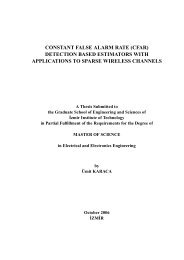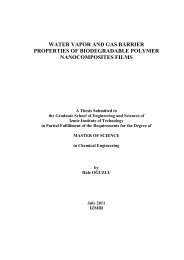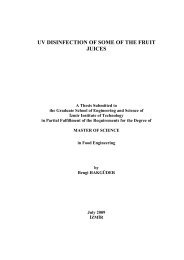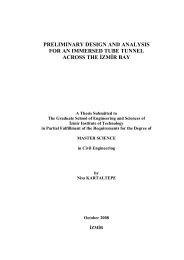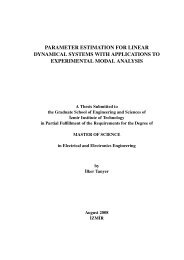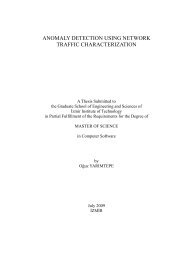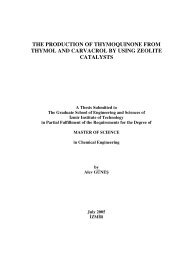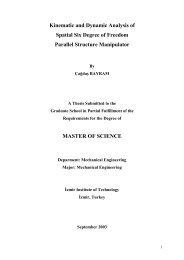a critical evaluation on the concept of justice in planning process
a critical evaluation on the concept of justice in planning process
a critical evaluation on the concept of justice in planning process
You also want an ePaper? Increase the reach of your titles
YUMPU automatically turns print PDFs into web optimized ePapers that Google loves.
2.5. Spatial C<strong>on</strong>siderati<strong>on</strong>s Based <strong>on</strong> Justice Debate and Changes <strong>in</strong><br />
Plann<strong>in</strong>g Theories<br />
The city plann<strong>in</strong>g activity is a way <strong>of</strong> spatial <strong>in</strong>terventi<strong>on</strong> realized <strong>in</strong> <strong>the</strong> aim <strong>of</strong><br />
organiz<strong>in</strong>g physical space. The fundamental purpose <strong>of</strong> physical space <strong>in</strong>terventi<strong>on</strong>s,<br />
which are held <strong>in</strong> public sphere by use <strong>of</strong> public power and c<strong>on</strong>siderati<strong>on</strong> <strong>of</strong> public<br />
benefit, is to atta<strong>in</strong> <strong>the</strong> desired level <strong>of</strong> development and physical space organizati<strong>on</strong>.<br />
This <strong>in</strong>terventi<strong>on</strong> <strong>in</strong> physical space aimed at encounter<strong>in</strong>g <strong>the</strong> spatial requirements <strong>of</strong><br />
society manifests that <strong>the</strong> discipl<strong>in</strong>e <strong>of</strong> plann<strong>in</strong>g is not <strong>in</strong>dependent from distributi<strong>on</strong>al<br />
relati<strong>on</strong>s <strong>in</strong> terms <strong>of</strong> its purpose and tools both. As for <strong>the</strong>se distributi<strong>on</strong>al relati<strong>on</strong>s<br />
compris<strong>in</strong>g distributi<strong>on</strong> <strong>of</strong> opportunities, costs and urban benefit, <strong>the</strong>y are <strong>in</strong>fluential<br />
up<strong>on</strong> both <strong>the</strong> physical and <strong>the</strong> socio-ec<strong>on</strong>omical structures.<br />
Debate <strong>of</strong> <strong>justice</strong> <strong>in</strong> relati<strong>on</strong> to <strong>the</strong>se <strong>in</strong>terventi<strong>on</strong>s <strong>in</strong> urban area has been<br />
majored <strong>on</strong> with urban analysis studies <strong>of</strong> Castells and Harvey 32 from <strong>the</strong> perspective <strong>of</strong><br />
political ec<strong>on</strong>omy.<br />
Collective c<strong>on</strong>sumpti<strong>on</strong> and <strong>the</strong> rise <strong>of</strong> urban social movements c<strong>on</strong>stitute<br />
Castells’ po<strong>in</strong>t <strong>of</strong> departure. Castells regards urban problems as c<strong>on</strong>nected with <strong>the</strong><br />
organizati<strong>on</strong> <strong>of</strong> comm<strong>on</strong> tools <strong>of</strong> c<strong>on</strong>sumpti<strong>on</strong> tak<strong>in</strong>g place <strong>on</strong> basis <strong>of</strong> daily life <strong>of</strong> all<br />
social groups. In his op<strong>in</strong>i<strong>on</strong>, <strong>the</strong> urban crisis is a special way <strong>of</strong> a more general crisis<br />
exposed by <strong>the</strong> c<strong>on</strong>tradicti<strong>on</strong> between productive powers and producti<strong>on</strong> relati<strong>on</strong>s<br />
(Castell,1997,12-15).<br />
Harvey, <strong>on</strong> <strong>the</strong> o<strong>the</strong>r hand, takes <strong>the</strong> history <strong>of</strong> urban development <strong>in</strong>to<br />
c<strong>on</strong>siderati<strong>on</strong> by elucidat<strong>in</strong>g <strong>the</strong> capitalist <strong>process</strong> via its spatial impacts and how<br />
severely it <strong>in</strong>creases <strong>the</strong> <strong>in</strong>equalities <strong>in</strong> social space (Harvey, 1993). Harvey and Castells<br />
both suggest that <strong>the</strong> basic problem <strong>of</strong> unequal development <strong>in</strong> urban spaces produced<br />
under relati<strong>on</strong>s <strong>of</strong> capitalist producti<strong>on</strong> lies <strong>in</strong> relati<strong>on</strong>s <strong>of</strong> producti<strong>on</strong> (Fa<strong>in</strong>ste<strong>in</strong>, 1996).<br />
In his first period studies, dur<strong>in</strong>g which he has focused <strong>on</strong> <strong>in</strong>equality and <strong>justice</strong>,<br />
Harvey dwells <strong>on</strong> how “just distributi<strong>on</strong> justly arrived at” as referr<strong>in</strong>g to <strong>the</strong> resources <strong>in</strong><br />
a liberal society can be possible. He c<strong>on</strong>siders space with<strong>in</strong> <strong>the</strong> <strong>in</strong>tegrati<strong>on</strong> <strong>of</strong> social<br />
<strong>process</strong>es and spatial form and emphasizes <strong>the</strong> significance <strong>of</strong> social <strong>justice</strong> and its<br />
pr<strong>in</strong>ciples <strong>in</strong> understand<strong>in</strong>g this holistic relati<strong>on</strong> (Harvey; 1993; 13-14). Rawls’<br />
32 The first period studies menti<strong>on</strong>ed here are namely Harvey’s Social Justice and <strong>the</strong> City (1993), and<br />
Castells’ City, Class, Power (1997).<br />
45



